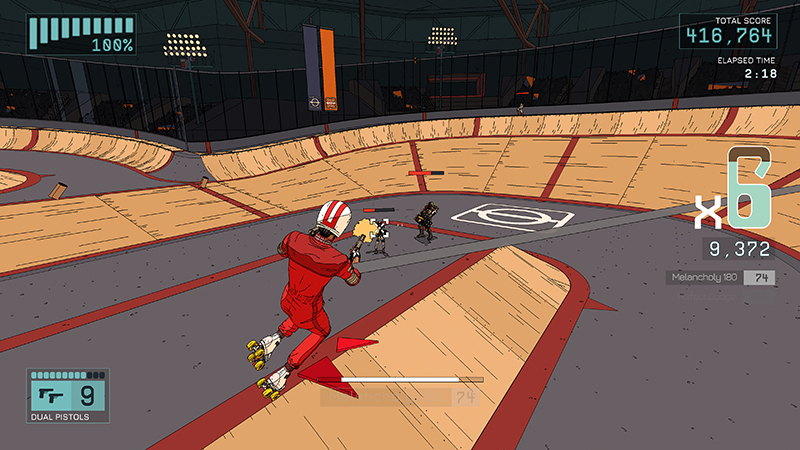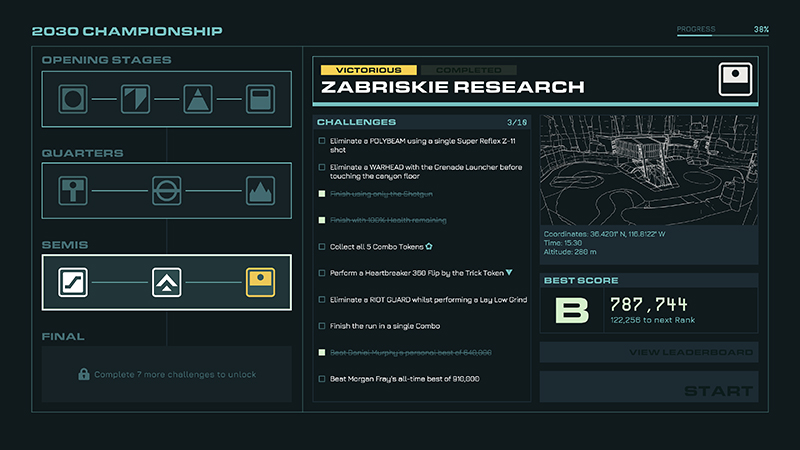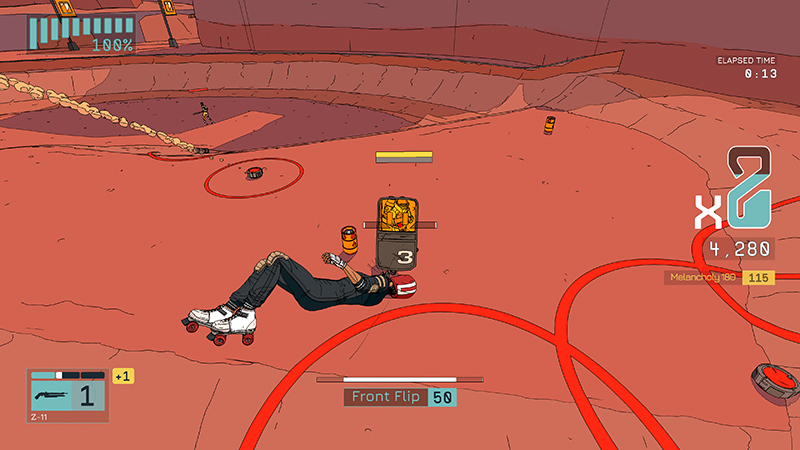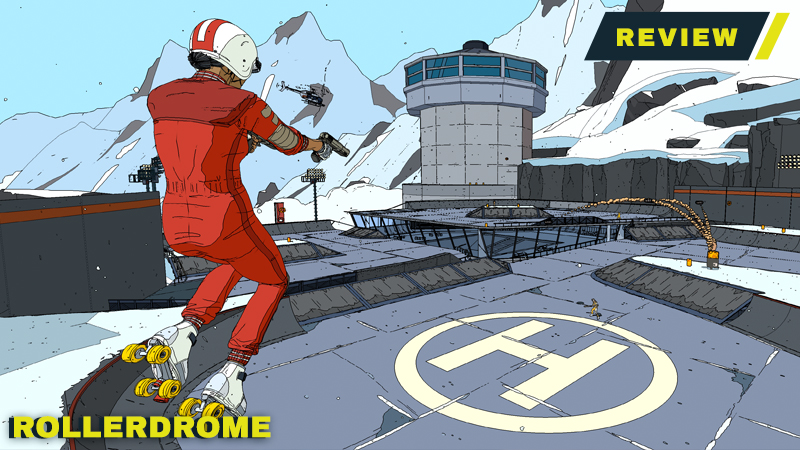Roll7 is at its best when its games are, fittingly, all about rolling around. Laser League and Not a Hero had their quirks, but the excellent OlliOlli is why the studio is as beloved as it is. The British developer has taken the essence of OlliOlli’s skating mechanics for Rollerdrome, swapped out the skateboard for roller skates, and given the main character more than a few guns. It’s about shooting as much as it is about doing tricks and that symbiosis creates some truly mesmerizing gameplay, even if it doesn’t maintain that high for as long as Roll7’s other skating series.
RELATED: Interview: How Roll7 Released 2 Games in 6 months Without Falling Apart
Rollerdrome’s title is derived from the dystopian bloodsport that’s at the core of its gameplay. The arena that sounds like it was directly torn from a 1970s film — which is also heavily reinforced by its overall eye-catching retro-futuristic aesthetic full of old analog tech — houses a sport where contestants blast opponents away while skating around. It’s already a unique mix of genres that’s worth exploring and only gets better when its systems start opening up and collaborating with each other.

Skating is a kinetic and nimble method of traversal and the constant forward motion naturally provided by roller skates means that players are always driven straight ahead and likely toward the danger. Doing tricks is also not only a visually interesting way to add to the score and show off, but they also refill ammo. These two systems are intelligently constructed to benefit one another since flips and grabs yield more bullets which are then used to kill in various stylish ways. Tricks are generally simple — only a direction or two and a button — and impossible to bail on and shooting is straightforward, yet Rollerdrome excels when its two easy-to-grasp halves are used in unison. The game is designed to ensure that players have to use its systems together so they are forced to see it at its best.
Rollerdrome has more under the surface, which is where it gets some of its replayability. Dodging is essential for survival, but dodging at the last second and aiming activates super slow motion where attacks deal more damage. It starts as a useful tool that gains more importance as the levels tick by since it can quickly dispatch its toughest foes in one clip. Sometimes it’s even better to leave snipers or mines around the level to always get a reliable source of extra damage — a skill-based tactic that’s only bested by the creative ability to trigger super slow motion off your own grenades.
While the pistol and shotgun use generous lock-on targeting, the railgun and grenade launcher have to be manually aimed, which rewards sharpshooters with more damage. Even the shotgun can dole out more damage if shots are properly timed in slow motion.
It takes some time to adjust to, but gradually improving and being able to seamlessly link everything together is exhilarating since that sort of fluidity has to be earned with practice. Jumping up a quarter pipe, flipping upside down, shooting a grenade at two hapless soldiers, and dodging an incoming rocket on the way down invokes the satisfying flow state that Roll7’s OlliOlli series is known for, albeit with more guns. There are some slight niggling issues with the controls like its occasionally sticky jump and lack of an aerial dash, but Rollerdrome’s combat is rewarding to learn because of how it looks in motion when everything is going right.

But Rollerdrome is not the smoothest skater in the rink because of how it handles its replayability. Chasing challenges is not a passive experience meant for hardcore players, as they are essential for progress. They can be turned off in the surprisingly extensive and welcoming accessibility settings, but that’s only a bandage that covers a deeper issue since they seem like artificial ways to extend the game’s runtime. Without them, it would likely take about 90 or so minutes to run through the whole thing. Forcing everyone to replay these stages multiple times in order to progress is one way to inflate the game’s hour count; a surprising turn considering OlliOlli World does no such thing. In that game, going back to grind challenges is an elective challenge, not a mandatory one.
RELATED: OlliOlli World Review: Ascending to Gnarvana
The challenges themselves are also harder to keep track of. Each stage has 10 challenges, but there’s no way to pin them to the side of the screen for easy access. It can be difficult to remember what type of grind to do or what weapon to use on what enemy and pausing the game to look temporarily kills the pacing, which is even more heartbreaking for a game that has such a fast tempo. It places so much emphasis on its exhaustive list of challenges, yet doesn’t make them a seamless part of the experience.
Rollerdrome has to pin a lot of its replayability on its challenges, too, since it is otherwise a bit lacking. Running through each level to unlock more challenges gets repetitive since there are only 11 stages bred from the same four biomes. The ramps and rails may be in different places, but they all visually blend together, as do the collection of six enemies. Its visual style is truly fantastic and unique, so the game is never anything less than a vibrant display of artistry, but it runs out of paint quickly when its scant supply of stages begin to repeat. Improving and trying to get better scores is still carried by its strong mechanics, but its samey levels and enemies mean it gets more repetitive than it should.

Completing the story mode unlocks the Out for Blood mode, which swaps in harder enemy configurations that deal more damage and a new thumping soundtrack of ‘70s-era tunes (that replaces the old thumping soundtrack of ‘70-era tunes). It’s incredibly difficult, as one or two mistimed dodges can spell death, and it does give seasoned players a way to truly challenge themselves in ways the default mode can’t provide. Being put through the wringer can be rewarding since it amps up the tension and compels players to step up their game, but it’s still full of the same levels and enemies that already repeat themselves enough in the core campaign. Going through the same stages yet again after hunting challenges in them is a tough sell, especially since dying over and over makes these variants even longer than they were the first time around.
Rollerdrome doesn’t completely nail every trick, but it’s still a smooth shooter with more style than most other entries in the genre. Spinning off ramps while nailing shots in slow motion and racking up the multiplier is a thrilling and cohesively designed loop that gets better as muscle memory kicks in and soothes the player into a meditative state. It might end earlier than expected, but the Rollerdrome is still worth visiting.
SCORE: 7.5/10
As ComingSoon’s review policy explains, a score of 7.5 equates to “Good.” A successful piece of entertainment that is worth checking out, but it may not appeal to everyone.









